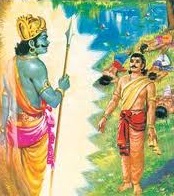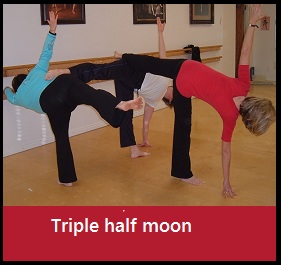The Baka in Hindu mythology comes from a story in the epic Mahabharata. Baka or crane is the disguise for a forest ogre inhabiting the forest where 5 brothers are exiled.
The good guys in the epic Mahabharata are 5 brothers and they have been exiled into the forest for 12 years. The oldest brother, Yudhisthira, was the wisest, most truthful, most level-headed of the brothers and a good choice to be the emperor, which he was before they were exiled.
While they were wandering, they badly needed water so from a tall tree one brother could see water a little ways off. Yudhisthira sent each brother in turn to fetch water and bring it back. It’s like a scene from a horror movie when none of the brothers comes back and finally Yudhistrhira has to leave his wife alone and solve the mystery of the disappearing brothers. The scary music could start now.
He finds the lake, and finds all his brothers dead along the bank. Yudhisthira is grief-stricken and bewildered. He sees the crane and it talks. Baka, the crane, says that he told each of the brothers that if they drank the water without the crane’s permission, the water would turn to poison and each would die.
With this challenge, each of the brothers saw the crane as an enemy challenging his strength, courage and rights. Each had a heart at war with the crane and a commission to fulfil from Yudhisthira and thus all were now dead.
Yudhisthira always represents the calm level-headed man and in this story he quiets his grief and anger and allows his cool head to be in control of judging the situation. Because Yudhisthira could see that the crane was not an enemy, the crane could shed his disguise and reveal that he was a forest Ogre or Yaksha. He challenges Yudhisthira that if he can answer 124 questions, the Yaksha will give him water.

Some of the questions are like riddles, some are teaching philosophy and some are teaching virtuous universal principles.
Here are a few of those questions:
The Yaksha asked, What is fleeter than the wind? And what is more numerous than grass?
Yudhishthira answered, the mind is fleeter than the wind; and our thoughts are
more numerous than grass.
The Yaksha asked, What is that which does not close its eyes while asleep; What is that which does not move after birth?
Yudhishthira answered, A fish does not close its eyes while asleep: an egg does not move after birth.
The Yaksha asked, What is that which sojourns alone? What is that which is re-born after its birth?
Yudhishthira answered, The sun sojourns alone; the moon takes birth anew.
The Yaksha asked, What is the best of all gains? And what is the best of all kinds of happiness?
Yudhishthira answered, the best of all gains is health: and contentment is the best of all kinds of happiness.
The Yaksha asked, What is the highest duty in the world? What is that which if controlled, leads not to regret?
Yudhishthira answered, The highest of duties is to refrain from injury: the mind, if controlled, leads to no regret.
The Yaksha asked, What, O king constitutes mercy? And what has been called simplicity?
Yudhishthira answered, Mercy consists in wishing happiness to all. And simplicity is equanimity of heart.
The Yaksha asked, What does one gain that always acts with judgment?
Yudhishthira answered, He that acts with judgment obtains whatever he seeks.
After many more questions the Yaksha is very pleased with Yudhisthira’s answers and tells him that no only can he drink as much water as he needs but to pick which brother he wants revived from death.
This choice is one of the events that make Yudhisthira the best of brothers. Yudhisthira is closest to his brothers Arjun and Bheem since they have the same mother, so either of those would be the natural choice, but he chooses his stepbrother, Nakul. They have different mothers.
The Yaksha asks why he would pick Nakul, his stepbrother and Yudhisthira says that it would be a way to honor both Mothers by allowing one son from each Mother to live in the world. This thoughtful choice and sacrifice wins the Yaksha over and he agrees to revive all the brothers.
In our dreams (and sometimes waking life seems like a dream) what appears to be an enemy is an ally in disguise. A confrontation with the enemy is an occasion for inquiry. We must ask ourselves the questions about what we really believe; our core values. Maybe by articulating and clarifying those values, the enemy will be revealed as a well-wisher and companion.
When we perform the posture bakasana, it is important for proper balance to maintain the focus of the eyes, head and not get too aggressive in getting the feet up off the floor. Just like Yudhisthira allowed for the best outcome by being wise, calm and focused on his duty.
Bakasana is an intermediate arm balance and can be challenging for beginners. Here are some options to do bakasana with props.






